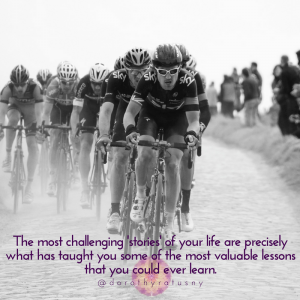How The Stories You Tell, Become The Inspiration For Your Life.
The stories that you tell reflect how you think. Stories are reflective of your perceptions and therefore are not always be based in factual information. What you tell yourself, you believe. The stories you tell unto yourself and others, define your life. They can also become the inspiration for what you live.
Can the stories that you tell yourself inspire you?
Using Cognitive Behavioral Therapy (CBT), I teach clients how to examine and challenge their thoughts; the thoughts that seem spontaneous and yet which are influenced by the underlying core beliefs that are deeply ingrained within each one of us by the time we begin our formal education.
What you choose to remember and think about can empower or diminish you. All of which is up to you.
Sometimes you will need guidance and help to rewrite the stories of your mind; the stories that have kept you mired in sadness and suffering. The mind adapts well to guidance and direction; and the repetition of how you train it.
Here I share with you the best practices to retrain the way you think; to become better at how you perceive situations as an unbiased observer; open to gather accurate information and to ask the questions that will help you to know and understand what is true, so that you may speak the stories that foster peace, insight, positivism and the inspired growth that is cultivated from deciding what is true.
These best practices arise from the tenets of Cognitive Behavioral Therapy (CBT), Mindfulness teachings, and the desire to seek and live an auspicious life in the presence of truth.
In the stories that you tell, consider the impact to you of how you retell the past because how you perceive what has already happened affects how you feel now and into the future. Your actions in the present are the result of what thoughts and beliefs you hold and the feelings that arise from what you think and tell yourself; and what you proclaim to others.
Consider if the story that you are retelling or ruminating upon (whether in your mind or as you speak it aloud), causes you to relive unpleasant emotions; if your story is an accurate portrayal of the truth; and also whether it reflects kindness (or blame) of another.
Consider if your stories and the thoughts that you hold, free you to look at the world and yourself with an attitude of optimism and possibility, of hope; and of seeing the good in others and in all of life; or whether you look for and find what is wrong, what is unjust, what will discourage, depress, and diminish others; and create sadness and a lack of hope. What you tell your brain, it will look for to support and confirm your opinion.
We all communicate by the sharing of ‘stories’; stories about our self and our life, about others; and the world at large.
Our socialization and how we relate to one another is largely based on expressing our self through the sharing of stories.
“Anthropologists tell us that storytelling is central to human existence; that it’s common to every known culture; that it involves a symbiotic exchange between teller and listener.” Source: WIRED
Stories can convey warm sentiments of times shared together; stories of your childhood and the memories that you recall with fondness; stories that depict poignant moments, life lessons, and reminders of your resilience, your growth; and your accomplishments.
The best practice in sharing information and storytelling begins with what you tell yourself. What you tell yourself you believe. What you tell yourself ‘is a story’. It is a version of the truth that is based on your perceptions and learned beliefs, your past experiences, and how these have imprinted upon you; your personality traits, your temperament, as well as your current mood state and mindset.
What stories do you tell? What inner dialogue continues to replay, causing you to be in the world inside your mind rather than the world in front of you and of the present moment?
The stories that you tell yourself and others do reflect inaccuracies. Your perspective can be biased, it can be unkind, unfair, or judgmental – of yourself and of course, directed at others.
For example, if you internalize an experience (without seeking to understand what happened from a higher vantage point; that of introspection and the ability to find accurate answers, to hold compassion, and to be forgiving), then your experience can be damaging as you suffer in silence and as you continue to focus on the story that you’ve told yourself rather than a more complete picture of what is true.
If you tell stories that are harmful in accusation and blame; or, if your thoughts about a particular situation or an exchange between yourself and another, cause you to feel hurt, guilt, anger, or remorse; and you continue to focus on “what is wrong” rather than attempt to gain a higher perspective and a greater understanding in order to help you seek and know what is true, you diminish your sense of self and the confidence that you need to explore and uncover the truth.
Consider if what you tell yourself is the whole truth (e.g. the accurate and factual truth). If your story makes you a victim; you will feel dis-empowered, judged, rejected and defeated. This is why it is so important to be sure that what you tell yourself and others, and what you believe is based on facts and what is true.
One way to know what is true is to ask questions, to find answers, to understand how another was thinking and feeling, and what their true intentions were. If you do not have access to this information from others, re-examine your story with an unbiased and truthful perspective; and with the right tools and process. Go inward. Use your intuitive wisdom (your heart wisdom) for the answers that you seek.
A simple practice for this is to write or speak aloud your question(s) directed into your heart center. Then to remain silent as you invite your answers from within. If the answers do not immediately rise up then continue to reflect upon your question(s) as you continue with your day. You will receive the answers to your questions. Typically these come in moments when you are fully present, open to receiving, and calm.
Since everything that has already happened is now a ‘story’ based on the perspective of whom is telling it, it’s important when communicating with others, to be mindful of the message that you wish to convey.
How do you want others to feel in your presence, to respond, to receive your messaging? How do you want to feel?
Make your communication a means of sharing the goodness you see in others, in a situation, or of the world, rather than a rant of what you found wrong and unjust. For example, share stories of your experiences after you have thought for a time about what greater meaning and purpose they have inspired or taught you.
Otherwise you will be repeating what happened to you from a biased and victim perspective, rather than with the insight that comes with seeking to first understand the significance of what your experience has revealed and what it serves to teach you. Everything teaches and informs us of something valuable, if we are willing to see this.
“The stories you tell reflect the way in which you think; and how you make sense of what has happened. The challenge is to tell the stories that convey what is true; and to open your mind and heart to all of the experiences of your life and what they have the potential to teach you.”
– dorothy ratusny
What serves you best is to first examine a story that you continue to tell your self. Maybe it is a story of a relationship breakup; or an injury or accident that you’ve since recovered – or not recovered from; or perhaps it is a story of personal hardship or a longstanding disappointment.
How do you feel each time you think about your story? Any story that is positive; that is uplifting will always be helpful to retell and relive; because you are doing just that; you are reliving each experience that you think about and retell.
“If the stories you dwell upon and talk about with others cause you to suffer, consider what is the upside, the life lesson, the opportunity for growth – that lies within your story?
This is both the message that you want to both glean and share.”
Let your story telling be to uplift others (and yourself), to reveal kindness, to inspire those who hear your words; because after all, what you are telling others is a reflection of you in this moment.
Speaking respectfully and with kindness reflects your beautiful nature. Speaking with criticism, jealousy or contempt limits your view of the world and of others. It dis-empowers you and leaves others feeling uncomfortable, hurt, or offended.
The challenge is to find ways of telling your story with kindness and a message that others may be helped by; even when your story reveals a difficult or ‘less than happy’ message.
Even stories of loss and tragedy can open us to appreciate life in new ways if we choose to focus on the important teachings that we have gleaned, and for what we are grateful of.
Here are the two most important questions to ask when considering the rethinking and retelling of a story that causes you pangs of sadness, anger, anxiety or any other form of suffering:
1. What is positive (e.g. helpful, necessary, good) about this experience?
2. How can I apply what I have learned (from this situation) in a constructive (and helpful) way to my life (even if this experience was not positive)?
It’s human nature to share the stories of your life. Sharing can help teach others, and we learn from the stories (and experiences) that others share with us.
Consider first the relevance your stories hold for how you feel and whether you are empowering yourself or being a victim.
Ask yourself: How do my experiences, and the stories that I tell, invoke opportunity for self-growth?
Can you find significant meaning in your story of what happened? Can you allow your experiences to be teachable moments, for yourself and for others (and especially if the experience may not have been positive?)
All of us have been affected by our personal stories of trauma, injustice, hurt, anger; of loss and sadness. If you are retelling these stories whether in your mind, or as you share them with others, you are reliving your experience.
The retelling of a story that caused you to suffer is not going to benefit you, especially if it continues to elicit unresolved raw (and painful) emotions, because the body will continue to relive the experience that the mind is thinking of.
Instead, look for and find the significance in what has happened. Learn from your experiences (including your decisions and the actions) that do not serve your highest potential.
Let your experiences be opportunities to grow and transform. In this way, your story becomes one of liberation, of courage, of understanding, infused vigor, wisdom, and the overcoming of failure and fear rather than remaining a victim to your experience.
How to glean the important lessons of your life experiences?
Tell yourself the story of what your experience has taught you. You do this by simply asking: “What have I learned from this experience?” and “How can I thrive beyond this experience?”
Know what you would do (or say) differently in a similar situation.
Tell yourself what is true; find the good in yourself, in others, and of the situation. There is always something constructive to be found in what has happened.
Challenge your thoughts by asking: “Are my thoughts and perceptions entirely accurate and true?”
Tell yourself the ‘true story’; together with your newfound knowledge and the life lessons that you have learned.
Ask yourself the questions that will help you discern what is meaningful about your story. This is how you realize that there is much that you can learn if you choose to see everything in life as an experience; rather than labelling what happens as “good” or “bad.”
Hold witness to what your experiences (and interactions with others) teach you; what you are being shown or encouraged to learn; and how this good has inspired your life. Let this be the constructive and helpful way that you tell ‘stories’ in your mind and to others.
In your new revelations and learned wisdom, you will realize that the most challenging stories of your life are precisely what has taught you some of the most valuable lessons that you could ever learn.
HOW TO CHANGE YOUR STORY TELLING…
1. Consider if you continue to focus on, replay, and tell stories that keep you stuck in a victim mentality. Do any of your stories serve to give you attention and sympathy?
Instead, remind yourself of your blessings and for what you are grateful. Let yourself no longer be held prisoner by the stories that you tell.
Tell the story of what your experience has taught you; how you have been helped or guided in your quest for understanding, of seeking to learn from what has happened, and how your experience has shaped you into an even more incredible version of yourself. This is how you tell a story that helps inspire and uplift others as well as yourself.
2. There may be a time when you will decide to stop telling a specific story; because the feelings that you continue to have as you hear yourself speak are still notably painful. Some stories are better released, relinquished for a time, or forever because we cannot find a different way to tell our story that is constructive and helpful to us. This is perfectly acceptable.
If a story continues to draw sadness, upset, anger, or any other form of suffering, perhaps it is a reminder of the need to rethink how you have been telling your story; to focus instead on the strength and empowerment that you are working to gather; and to consider an alternative perspective based on yourself, the other person, or the situation that may bring relief to how you have been thinking.
3. Write your thoughts in a journal with a neutral perspective. Remember that your experience does not define who you are. Consider that your experience and your story has the potential to imprint positive change and growth. Find a way to think of the past (and the story of what has happened) in a way that incites learning, inner strength, discipline, and resilience. Focus on the need to thrive and not falter in spite of this experience.
4. The principles of cognitive behavioral therapy (CBT) teach us how to observe and then challenge our thoughts; to ask the question, “Are my thoughts and the stories that I am telling myself, completely true?” and then to find alternative perspectives as you seek the truth.
Challenge your thoughts whenever you feel an unpleasant emotion. Look for ways of disproving your thoughts and stories when you point blame at others; when you are self-critical and effacing.
Instead, challenge yourself to see the whole truth; to ask yourself, “What are the facts?” and “What is true?” These are all CBT best practices which help you to examine the truth and to help you gain a different and greater perspective; and to see that you are not a victim.
I cannot begin to count the number of times that in deconstructing a tragic or even traumatic experience for a client in a way that offered hope, a difference of perspective, and self-empowerment, raised a very different and yet accurate means of reclaiming one’s sense of self.
If you find that your efforts to retell your stories are challenged because of the nature of what you have experienced, then please reach to me; let me help you to find a different way of approaching how you think about your past; so that you may live of your present moments in the comfort of peace.
5. The basic tenets of cognitive behavioral therapy teach us that our thoughts determine how we feel, and how we feel predicts and affects our actions and reactions. Everything you do is based on how you feel; and how you feel is the result of what you tell yourself (and others). It is in the stories that you hold in your mind and in what you speak that is the precursor for everything.
The stories that you tell, define you.
Your stories reveal the important teachings; symbolic of what you have learned and discovered about yourself and of what you have needed to overcome.
Tell these stories from a healthy framework of life lived so that you can help others; you can share in laughter; and so that you can offer wisdom, encouragement and hope.
Tell your stories, but do so from a perspective of what you have learned about yourself in order that you may gain knowledge, insight and an empowered way of thinking about the past. This can also be helpful for when you tell your story to others.
Namaste!
Please share with me in the comments section how you have benefited from this post; how it has impacted the way in which you think about and share your stories. Thank you!! ?
More Self-Empowerment and A Positive Mindset:















